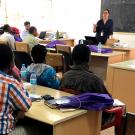This presentation provides an overview and introduction to the Horticulture Innovation Lab project focused on building postharvest capacity in Tanzania. The presentation was given by Eleni Pliakoni of Kansas State University, as part of the Horticulture Innovation Lab's 2018 annual meeting in Kigali, Rwanda.
The overall objective of this project is to improve the capacity of faculty and support staff at Sokoine University of Agriculture (SUA) related to postharvest management of horticultural crops and to better train undergraduate and graduate students, extension agents, farmers and other stakeholders working with fresh produce.
To that end, the team is working with several major goals:
- Support development of curriculum for Master's of Science program in Horticulture. Improve and develop postharvest classes in undergraduate and graduate level.
- Support development of Horticulture M.S. program, improve postharvest courses in the existing Horticulture B.S. program, and develop new Master's level postharvest specialization courses.
- Equip SUA faculty with proper teaching and presentation methods in training exchange programs.
- Develop and deliver a short course on postharvest management of horticultural crops
- Develop modules for the short course outreach programs in the area of postharvest management of fresh produce.
- Disseminate module knowledge through training the future Tanzanian trainers.
- Disseminate module training through extension and outreach
- Improve infrastructure at SUA to support postharvest research, teaching and extension activities.
- Equip and modify the postharvest laboratory at SUA.
- Incorporate appropriate postharvest technologies.
- Field research/visits for technology optimization/transfer.
In December 2017, SUA approved a Master's of Science in Horticulture with a specialization in postharvest management. The team is monitoring the existing courses and also revising an undergraduate horticulture postharvest course, focused on postharvest physiology and management. The team is making plans for the undergraduate course and graduate postharvest and produce safety courses to be taught during the 2018-2019 academic year.

